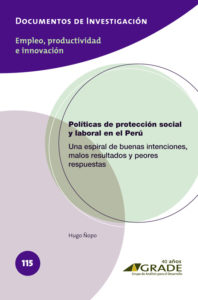Políticas de protección social y laboral en el Perú. Una espiral de buenas intenciones, malos resultados y peores respuestas
| Year | : | 2021 |
|---|---|---|
| Author/s | : | Hugo Ñopo |
| Area/s | : | Employment, productivity and innovation |
Ñopo, Hugo (2021). Políticas de protección social y laboral en el Perú. Una espiral de buenas intenciones, malos resultados y peores respuestas. [Documento de Investigación, 115]. Lima: GRADE.
The legislation stipulates that, with some exceptions, every worker and their family members are covered by a social safety net that is financed by contributions from employers and workers. This legislation, to a large extent, is violated; and, to another extent, it has exceptions. As a result, most workers do not enjoy contributory social protection. The demand for such protection is then satisfied by other means: families and the State. However, when the State provides social protection for those who did not obtain it formally in the labor market, it introduces distortions: the incentives to contribute to social protection that comes from labor relations are reduced. This is especially relevant in low-productivity jobs. As a reaction to the latter, the State has been creating special schemes to contribute to social protection, with reduced rates for the self-employed and for micro- and small enterprises —and, in some cases, also creating exemptions—. These special regimes have not only been ineffective in their objective of providing social protection, but have also brought additional distortions: companies face incentives against their growth. Thus, a spiral of good intentions is formed that do not materialize in the desired results, that induce partial solutions, that bring new problems and that, in the end, lead society to a balance of low social protection and low productivity . In this balance, society develops a set of behaviors that fuel informality: buying without an invoice, negotiating non-contributory labor contracts with employers, and so on. The solution to this problem should point to your focus: labor law.






